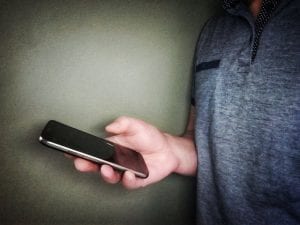What is a smartphone?
By Daniel Miller, on 1 June 2018
Author: Daniel Miller

Photo (CC BY) newkemall
I have spent the last two months in my Irish fieldsite trying to answer a simple question: what is a smartphone? Actually, it’s a fiendishly difficult question. Several older people started our discussion by insisting that the only things they use their phones for are voice calls and texting. Once we looked at the phone in more detail, it turned out that just the most common functions include WhatsApp, maps, voice calls, camera, alarm/time, Facebook, text messages, calendar, weather and news. Once we add a variety of more specialist apps such as sports, music, airlines, banks etc. we easily reach the most typical result which would be that an individual uses between twenty-five and thirty different functions of their smartphone.
In the newspapers, the personalisation of the smartphone is understood as the advances in algorithms and artificial intelligence, which allow smartphones to learn from people and predict their behaviour. But, just as in our previous Why We Post project, for the ethnographer, these corporate developments pale into insignificance compared to the personalisation represented by the diversity of usage that will arise from the way an individual configures this multitude of apps.
Indeed, it may be the personality of the user that comes across most. A man expresses a particular version of masculinity in demonstrating how all his usage is based on need and pragmatism. He mentions more than once how, now his daughter is no longer in Australia, he will never use Skype again. By contrast, a woman, aged 69, has every last detail of her life, from the steps involved in paying each particular type of bill, to the slide decks from workshops she has attended, all carefully classified in nested hierarchies of icons on her iPhone. About the only thing she doesn’t like is the clumsy and intrusive Siri. In both cases the smartphone effectively expresses their personality. Sometimes a particular activity dominates an individual’s phone life; a phone where everything is geared to a retirement spent playing and teaching the banjo, or a phone that contains seven apps all associated with sailing. It’s not that a woman is addicted to her phone, or even to YouTube per. se., it’s just that she can’t stop spending two hours a day following US politics on YouTube. More commonly the phone will revolve around three or four key activities and concerns such as a combination of family, sports, holidays, and photography.
Working with people in their 60s and 70s, I come to appreciate that they are not elderly, but that much of their life may be devoted to caring for an elderly parent in their 90s. For some of these people everything about the phone is connected with this responsibility of care, whether mobilising family care through WhatsApp, showing pictures of great grandchildren through Facebook, using maps to get to a hospital appointment, employing phone and text to negotiate with the local council and never turning the phone off, because you never know…
An equally important component of what makes the phone is people’s lack of knowledge. An older person is told to download an app, but she has never heard of Google Play and so attempts this action using an icon labelled ‘Downloads’. A man won’t buy a new Samsung Galaxy because it doesn’t have an inbuilt radio and he doesn’t know he can download radio as an app. Many users do not know the distinction between Wi-Fi and data that they have to pay for, so they won’t watch video while on Wi-Fi because they think it will cost them. Many can’t understand that a phone which ‘doesn’t work’, is not a broken phone, rather they just need to go about something in a different way. This is because the smartphone has so little in common with traditions of machines and tools. There is no manual they can actually use. Trying to work out precisely why one 80-year-old finds every little step impossible and another seems entirely comfortable in using these phones may give us many clues as to what, in effect, a smartphone is.
In the newspapers the smartphone appears as the constant development of new capacities – articles about the latest thing you can do with your smartphone are commonplace. For the ethnographer the smartphone is the myriad constellation of new actualities – we strive for an appreciation of what ordinary people create with or cannot understand about these devices.
One Response to “What is a smartphone?”
- 1
 Close
Close





[…] Daniel Miller’s What is a Smartphone. […]